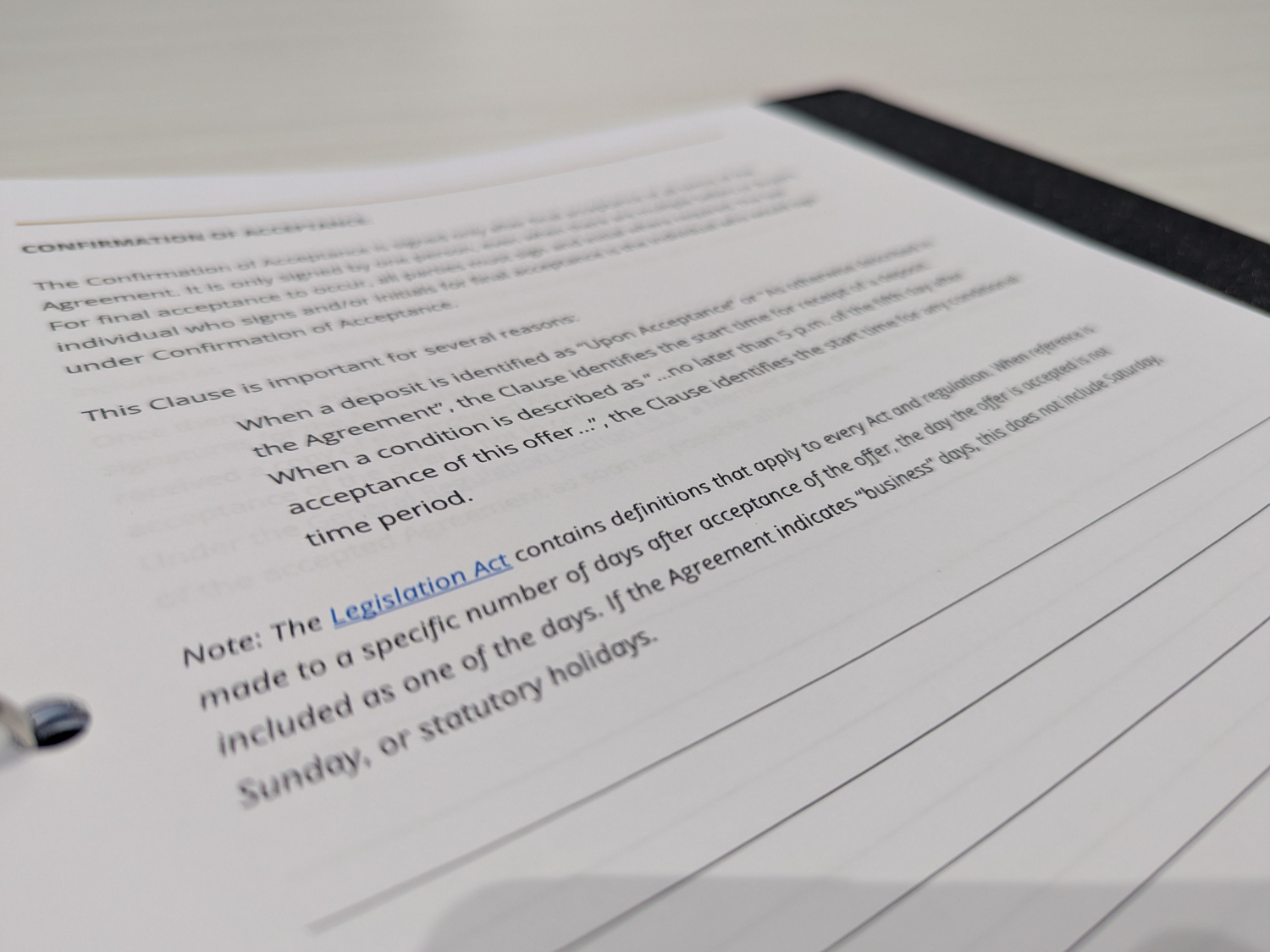Navigating the not so New Landscape: A Comprehensive Guide to TRESA Phase 2 for Ontario REALTORS®
I. The Essentials of TRESA Phase 2 at a Glance: You've Had More Than Enough Time to Embrace It, It's Time We Master It.
Effective December 1, 2023, TRESA Phase 2 fundamentally overhauls Ontario real estate, prioritizing consumer protection, transparency, and professional standards over REBBA. For
Century 21 Leading Edge and Century 21 Atria REALTORS®, mastery is crucial. Key shifts:
- Mandatory REALTOR® Cooperation Policy: Public marketing now triggers an MLS® System listing within three days.
- Designated Representation: Individual agents within the same brokerage can represent different clients, with strict confidentiality.
- "Self-Represented Parties" (SRPs): The "customer" role is gone; stringent disclosures clarify the agent's limited, impartial role.
- Offer Content Disclosure: Sellers gain discretion to share offer substance, but agents face strict rules on confidentiality and consistent communication.
- Implied Representation: Clear definitions delineate actions that inadvertently create agency relationships.
These changes demand diligence and adaptation. Our Masters Edge Class provides the deep dive necessary to navigate these complexities, ensuring you're not just compliant, but truly leading.
II. Introduction: The Dawn of a New Era in Ontario Real Estate
December 1, 2023, marks a critical shift for Ontario real estate: the full implementation of TRESA Phase 2, replacing REBBA. This legislation aims to enhance consumer protection, clarify representation, and elevate professional standards. The Act's emphasis on "Trust" demands a more ethically robust and publicly accountable marketplace.
This article will dissect core changes: REALTOR® Cooperation Policy, Designated Representation, Self-Represented Parties, managing and disclosing offer content, Buyer Representation Agreements, and Broader Member Disclosure Obligations. For REALTORS® at Century 21 Leading Edge and Century 21 Atria, and those who have progressed Beyond the Humber Real Estate Course, our Masters Edge Class offers the essential deep dive, translating complex regulations into actionable daily practice. Mastering these rules is key to unparalleled expertise.
III. TRESA Phase 2: A Summary of Transformative Changes including CREA
This section provides a direct, comprehensive overview of TRESA Phase 2's key regulatory shifts, detailing their immediate and practical impact on daily real estate operations.
A. The REALTOR® Cooperation Policy: Mandatory Exposure, Enhanced Transparency
Effective January 3, 2024, this policy mandates MLS® System use within three (3) days of any "Public Marketing" (e.g., flyers, yard signs, public websites, social media; excluding one-to-one REALTOR® communication). Exemptions include commercial, new construction, and rental properties. If a seller opts out, REALTORS® must disclose MLS® benefits and obtain written acknowledgment of risks (reduced exposure/offers) via the REALTOR® Cooperation Disclosure and Consent Form. Any Public Marketing, even after opt-out, requires MLS® listing within three days.
B. Redefining Representation: Designated Representation and Self-Represented Parties
TRESA Phase 2 fundamentally redefines client representation through the introduction of Designated Representation and the formalization of Self-Represented Parties (SRPs), demanding a precise understanding of loyalty, confidentiality, and disclosure from every REALTOR®. Under Designated Representation, a brokerage appoints specific individual brokers or salespersons as 'Designated Representative(s)' to act with undivided loyalty and exclusive access to confidential client information. This allows two agents from the
same brokerage to represent both buyer and seller in a single transaction, mitigating traditional multiple representation scenarios. Only these designated agents owe fiduciary duties, while other brokerage members remain impartial. Client consent is
expressly required for any change in designated representative. For open houses, if the designated representative cannot host, another impartial agent from the same brokerage can, provided the seller consents and understands confidential information will not be shared, and the hosting agent may seek to represent prospective buyers. Concurrently, the ambiguous 'customer' is replaced by 'Self-Represented Party' (SRP), identifying individuals without brokerage representation. REALTORS® interacting with SRPs must act
solely in their own client's best interests, strictly prohibiting advice or opinions to the SRP. Any information an SRP shares, including confidential details like motivation or price willingness,
must be shared with the agent's client, underscoring the absolute lack of confidentiality for the SRP. Before providing any assistance, agents
must provide and thoroughly explain the RECO Information Guide and the RECO Information and Disclosure to Self-Represented Party form, ensuring the SRP understands the risks, the limited nature of assistance, and the strong recommendation to seek independent professional advice. SRPs retain the right to seek full representation at any point.
1. Designated Representation: Unwavering Client Loyalty
Brokerages appoint individual brokers/salespersons ("Designated Representative(s)") to represent clients, owing undivided loyalty and exclusive access to confidential information. Other brokerage members act impartially. If a team, all members must be named. If a designated representative becomes unavailable, another agent can be designated with client's
express written consent. This model reduces traditional multiple representation.
Open House Responsibilities: If the seller's designated representative cannot host, the seller can consent for another non-representing agent from the same brokerage to host, or postpone. Informed consent, risk minimization, and clear written direction are required. The hosting agent must communicate their non-representative role and provide only factual information.
2. Empowering the Self-Represented: New Disclosures and Responsibilities
"Customer" is replaced by "self-represented party" (SRP), meaning individuals not clients of a brokerage. RECO's Information Guide and Disclosure form highlight significant SRP risks. An agent's obligation is
solely to their own client. Agents are prohibited from providing services, opinions, or advice to SRPs, or encouraging reliance on their judgment. Any assistance (e.g., factual information) is a service to the agent's client, facilitating
that client's transaction, not representing the SRP. Crucially, anything an SRP tells an agent (e.g., motivation, price willingness)
must be shared with that agent's client, underscoring the absolute lack of confidentiality. Before providing
any assistance, the agent must provide and thoroughly walk the SRP through the RECO Information and Disclosure to Self-Represented Party form. SRPs can change their mind and seek full representation at any point.
C. Clarifying Engagement: Implied Representation Under TRESA
Under TRESA, a representation agreement can be written, oral, or implied. An implied agreement arises when a real estate professional, without a formal written agreement, provides a service, offers an opinion, or gives advice to a prospective seller or buyer. Once created, the professional immediately owes full client duties.
TRESA specifies exclusions that do not create implied agreements: assisting another person as a service to a client without encouraging reliance, or providing general real estate information. These allow professionals to assist SRPs or provide general information without inadvertently forming a representation agreement, provided no opinion, advice, or encouragement of reliance is given.
Examples: Providing a CMA and discussing marketing strategies with a prospective seller, encouraging reliance, forms an implied agreement. Similarly, a broker at an open house offering opinions on property value and advice on drafting an offer creates an implied agreement.
Once an implied agreement is created, the professional must retain any confidential information learned; it cannot be shared. Brokerages should ensure written agreements are obtained early to avoid ambiguities. TRESA Sections 13.5 and 13.6 mandate that if a seller or buyer representation agreement is not in writing, it must be reduced to writing as soon as possible, before any offer, signed by the brokerage, and provided to the client for signature.
D. Managing and Disclosing Offer Content: Seller Discretion, Agent Responsibilities
Under TRESA, sellers now have the discretion to share the substance of competing offers and can change their mind at any time, as outlined in TRESA General Regulations, Section 22.7.
Seller's Discretion and Agent's Responsibilities: An agent must communicate the number of competing offers to every buyer. Sharing the
substance of offers is only at the explicit direction of the seller. Sellers can choose specific parts of offers to share (e.g., price from one, deposit from another), but if content is shared from different offers, the agent must disclose this to all parties. Personal or identifying buyer information cannot be disclosed. The
same information must be shared with all buyers making a written offer. OREA Form 652, 'Brokerage Communication,' can notify brokerages of competing offers and seller direction to share substance. If sharing, clear, written instructions from the seller are essential, using forms like OREA Form 209, 'Seller Direction to Share Substance of Offers'.
Buyer's Non-Disclosure Clauses: Buyers can include clauses to prevent disclosure. OREA provides DISC-1 'No Offer Content Disclosure' (allowing offer revocation if disclosed) and DISC-2 'No Offer Content Disclosure Covenant' (seller covenants not to disclose before acceptance, or until conditions are waived/fulfilled).
E. Broader Member Disclosure Obligations
Beyond specific transactional disclosures, TRESA mandates broader disclosure obligations for all real estate professionals, reinforcing transparency and client protection. All disclosures
must be written clearly, concisely, in plain language, and prominently labeled as "disclosure".
Key Disclosure Areas Include:
- Multiple Representation: Obtain informed written consent from all clients if representing more than one client with competing interests in the same transaction, detailing how duties, services, or remuneration might change.
- Disclosure of Multiple Clients to Buyers: If a brokerage represents both a buyer and a seller, disclose this to all competing buyers as soon as possible after receiving another written offer and before any offer is accepted.
- Material Facts: Disclose all known material facts—anything affecting a reasonable person's decision to acquire or dispose of real estate—to clients. Ensure sellers' legally required disclosures (e.g., latent defects via OREA Form 299) are made to prospective buyers.
- Information Statement Regarding Seller's Property: Inform prospective buyers of its existence and make it available upon request if a seller completes one (e.g., OREA Form 220).
- Disclosure of Interest: Disclose direct or indirect interest in a property being bought or sold to the seller or buyer (e.g., OREA Form 160 or 161).
- Remuneration: Disclose any seller-brokerage agreement terms that could affect offer acceptance to all competing buyers before acceptance.
- Financial Benefit: Disclose any direct or indirect financial benefit received from another person in connection with client services as soon as possible (e.g., OREA Form 610).
- Third-Party Goods or Services: Provide specific information, including payment responsibility, before entering an agreement with a third party on a client's behalf.
- Conflicts: Disclose any actual or potential conflict between interests and those of the client where loyalty could be impacted. Consent is required to proceed.
- Deposits: Brokerages must disclose in writing the terms of deposits made to their Real Estate Trust Account, including whether it's interest-bearing and the interest rate received.
OREA Form 602 can be used for many disclosures where no specific form is identified.
Summary

IV. Mastering TRESA Phase 2 with Century 21 Leading Edge and C21 Atria
This guide has provided the essential framework for understanding TRESA Phase 2's foundational changes. For every REALTOR® at Century 21 Leading Edge and Century 21 Atria, and for those who have moved Beyond the Humber Real Estate Course, mastering these changes is paramount. This isn't about passive learning; it's about active integration into your daily operations. Our Masters Edge Class is specifically designed to provide the deep dive required, ensuring you not only understand the letter of the law but also its spirit and practical application. Embrace these changes, know them inside and out, and solidify your position as a top trainer in the real estate industry.






.avif)




.png)




